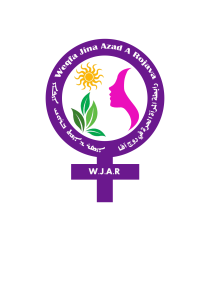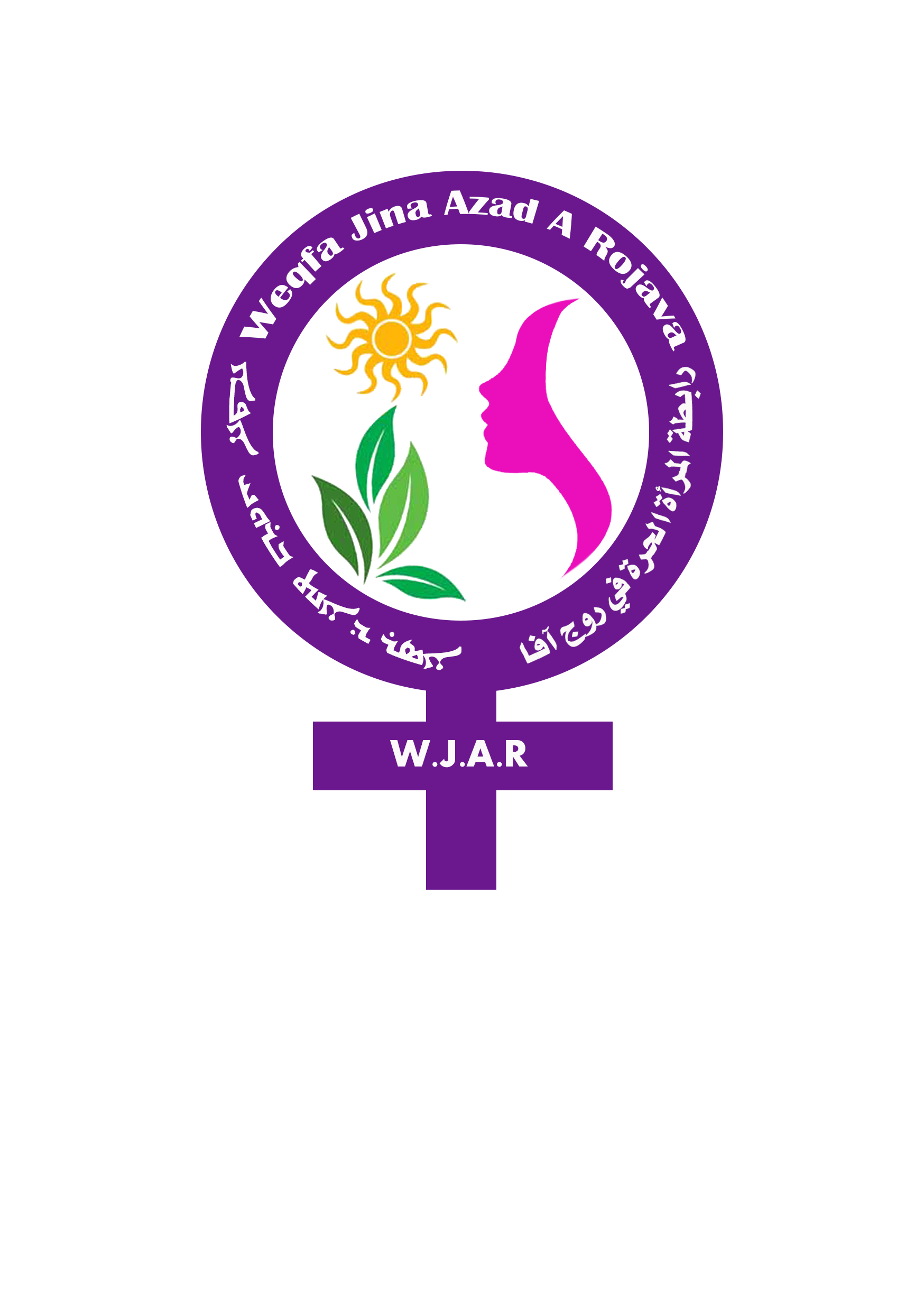 On 21 September 2014, the International Day of Peace, a women’s organisation for feminism in the Middle East was founded. The Foundation of Weqfa Jin Azad in Rojava (Foundation of Free Women of Rojava) was established, in a region in which war reigns, which has shocked the world through its brutality, but also in the context of a great and radical social change and revolution, especially as regards the role of women, which has inspired the world. The Foundation works with the motto “The free woman is the basis of a free society.”
On 21 September 2014, the International Day of Peace, a women’s organisation for feminism in the Middle East was founded. The Foundation of Weqfa Jin Azad in Rojava (Foundation of Free Women of Rojava) was established, in a region in which war reigns, which has shocked the world through its brutality, but also in the context of a great and radical social change and revolution, especially as regards the role of women, which has inspired the world. The Foundation works with the motto “The free woman is the basis of a free society.”
The goal of the Foundation is ambitiously high. Through their work, they want to support women in Rojava, Syria and South Kurdistan in the process of emancipation. They are working for a comprehensive psychological and medical support for women and children, managed by women themselves. Through their nurseries they are forming education for children of all ethnicities in every mother tongue, with the goal of equality between sexes, peoples and religions, and for ethnic and democratic coexistence. They make it possible for women to enter into the economy through establishing cooperatives, creating training opportunities and work for women in different fields, and open up spaces in which women can sell their handwork. Not last, they create living space for women, in which they have the possibility of working through their traumatic experiences of war and to develop their own abilities and talents.
To mark the first year since the Foundation it is worth looking back at what has been achieved, as a balance sheet and overview for further visions.
The establishment of the Foundation
The Foundation was founded by women themselves, dividing the work into five different areas: education, health, economy, press & publicity, and research & projects. The different fields clearly overlap, and indeed there is cooperation across them.
One of the first projects was started jointly with the Council of Yezidi women from Sengal (Sinjar) in Camp Newroz in order to improve the physical and mental health of the women in the camp (and later in Sengal) and their economic situation. The Foundation has set up a women’s sewing room in the camp. The residents wanted to wear their traditional Yezidi clothing; the women learn how to make these and many other items. Together with a psychologist, small and large psycho-educational groups have been held for the women in the camp, in which the impact of war and its psychological and physical consequences has been brought to light. With the help of members of the doctors’ council of Cizîrê canton, the Foundation also organises health checks for women and children, with medicines supplied in Sengal.
Soon after the establishment of the Foundation for the Free Women in Rojava, it began working with the umbrella organisation Yeketiya Star, for women of the communes and councils, so as to organise a survey of the women in the city of Qamişlo (Al-Qamishli), in order to learn about the living situation and monetary income of the women, and to ask about their life plans and desires. This focused in particular on their desire for education and employment opportunities, as well as education and care services for their children.
The development of the Foundation’s projects
The projects which the Foundation developed out of the survey are the construction of pre-schools, of women’s health centres, of women’s cooperatives and the establishment of women’s parks.
In Qamislo four preschools have been opened with 30-45 children. The teachers in preschools are all members of the Foundation. In weekly meetings, they can discuss problems and opportunities for the development of children’s problems and challenges, as well as opportunities for improving the quality of work. The Foundation will also organize, in addition to the daily preschool program, education for teachers, parents and children. For both adults and children this is providing an important opportunity to reflect on society and their role within it.
The first Women’s Health Centre was opened by the Foundation of the Free Woman in Rojava in Serê Kaniyê (Ras al-Ayn), where a wide range of plans are being made. Currently there is a weekly clinic for women and also a special clinic for children. Natural health options of collected and dried herbs have been offered from the start by members of the Foundation, as well as gymnastics for physical health. Seminars have been offered for prevention and information, again in cooperation with Yeketiya Star and the Council of Physicians in Qamislo. In both Serê Kaniyê and Qamislo the Step-by-Step Foundation provides a basic training for women in healthcare.
The construction of three women’s cooperatives (a tailors, an agricultural cooperative and a women’s café), was begun late last year together with the Women’s Council in Til Temir. By these means the women want to form an economic basis together. This work had to be stopped due to the war. Now that Til Temir has been cleared of the Islamic state (IS) and the residents have returned, the construction of a café for women’s cooperative has started. The Council of Til Temir has given the Foundation the café at the cemetery for the fallen.
With the agreement of the city council in relation to the use of park land, the Foundation has begun to design a women’s park in Qamislo. The park will be a public natural space available for women to leave their worries and the stresses of war: a natural environment is helpful for the development of new ideas. On completion, therapy and counseling will be offered, and a women’s cafe established.
The new Foundation’s latest project is the establishment of women’s villages. A women’s village will allow women to build an independent life together away from violent relationships. In the collective village life they can create a new perspective on collective social and personal life, discover and learn their capacities and talents, and construct an autonomous life independent of violent and oppressive relationships. The construction of the village has already begun.
Huge steps have been made in the Foundation’s first year. It has been clear from the start that the Foundation has to ask the needs of women so as to go forward together with appropriate projects. Unlike many other foundations, there is a basic relationship between the women and the Foundation, working promptly, creating a dynamic and building a relation of trust. For these reasons, the women see the Foundation as a partner with whom they can organize themselves in projects by which to independently develop solutions to the difficulties in their lives.
In this manner, an ethical way of working with civil society organizations is being redefined. If foundations, associations or charities are to be established, their approach and organization must correspond to the objectives of the target group.
Too often, only a very few of the suffering thousands of people, women, children and men are helped, although virtually all donations and donations go to benefit those in need, so it is claimed. To what extent do charities and foundations truly play a role in bettering the living conditions of refugees, needy and suffering? Or do they aggravate the suffering with their approach, supporting the domination and political exploitation of those who benefit from the situation?
The Foundation for the Free Women of Rojava has already shown this year that its work is on the side of women and children in need. It has made it clear by example that it is based on self-help and empowerment, corresponding throughout to the motto: ‘the free woman is the basis for a free society!’.
Opportunities to support and participate in the Foundation’s work
The Foundation’s work can be supported in three ways. For the organisation, solidarity for all peoples involved is the most important. The women’s Foundation encourages active coexistence between organisations, groups and individuals. This can be supported in three ways:
- Activities for the recognition of the women’s Foundation are important, organising material and intellectual support for the Foundation. This can be done through events, interviews, fund-raising, etc.
- The women’s Foundation educates women in different fields of work: healthcare, therapy, education and pedagogy, bakery and café organisation, land economy and tailoring. Women wanting to show solidarity in all lands, with an interest and related expertise, can share their knowledge in the form of seminars and educational work.
- Financial support is of course also needed for the projects described above. Donations can be sent to our partner organisations. But material donations are also necessary for kitting out the women’s health centres (especially gynecology, physiotherapy and the lab), the pre-schools, sewing workshop, medications, etc.
To cooperate with the Foundation of the Free Women of Rojava, please send your details to the following contact:
Weqfa Jina Azad a Rojava (Foundation for the Free Women of Rojava)
jina.azad2014@gmail.com
Facebook: Weqfa Jina Azad
Website: www.weqfajinaazad.org
European contacts:
c/o International Free Women’s Foundation,
Beukelsdijk 149C , 3022-DC Rotterdam, Holland
Tel.: 0049 151 120 70 278
Mail: wjar2014int@gmail.com
Donations to our partner organisations in Europe should be specific with the keywords as give below, so that they can be forwarded to us:
International Free Women‘s Foundation
Keyword: WJAR
Internationale Vrije Vrouwen STG
IBAN: NL35 INGB 0006 2185 45
BIC: INGBNL2A
Kurdistan Hilfe e.V.
Keyword: Frauenstiftung in Rojava/WJAR
Bank: Hamburger Sparkasse
BAN: DE40 2005 0550 1049 2227 04
BIC: HASPADEHHXXX
Translation of article by Roza Nudem published in German “Kurdistan Report”, September-October 2015

